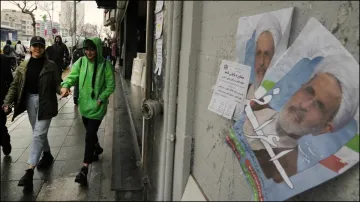Tehran: Iran's parliamentary candidates began campaigning on Thursday in the Islamic country's first election since a ruthless nationwide crackdown on the 2022 protests that followed the death of 22-year-old Mahsa Amini in police custody. A record 15,200 candidates will compete for a four-year term in the 290-seat chamber, more than double the candidates in the 2020 election.
Amini was arrested by the so-called Iranian Morality Police for not wearing the burqa (a black scarf) properly in a public place. Several videos that went viral on social media platforms showed she slipped into a coma after being tortured brutally by the Iranian police. This prompted worldwide protests against the country’s conservative Islamic theocracy.
Authorities responded with a violent crackdown in which more than 500 people were killed and over 22,000 others were detained, according to rights groups. The demonstrations largely died down in early 2023, but there are still widespread signs of discontent. For several months, women could be seen openly flaunting the headscarf rule in Tehran and other cities, prompting a renewed crackdown over the summer. Amini was awarded the EU human rights prize posthumously.
Iran's election campaign
The Iranian Guardian Council election watchdog on Wednesday sent the names of the 15,200 qualified candidates to the interior ministry, which holds the election. Any candidate for elections in Iran must be approved by the Council, a 12-member clerical body, half of whom are directly appointed by the supreme leader.
The candidates include 1,713 women, which is more than double the 819 who competed in 2020. The election will be held on March 1, and the new parliament will convene later in May. Incumbent assembly member President Ebrahim Raisi will seek reelection to the assembly in a remote constituency in South Khorasan province, competing against a low-profile cleric.
Current parliament speaker Mohammad Bagher Qalibaf will run for the election from his hometown, a constituency in the remote northeast, after winning a seat in the capital Tehran four years ago. In recent years, his fellow hardline critics occasionally accused him of ignoring the rights of other parliament members and disregarding reports of corruption while he was Tehran's mayor.
In a simultaneous election, 144 clerics will compete for the all-cleric 88-seat Assembly of Experts that functions as an advisory body to Supreme Leader Ayatollah Ali Khamenei, who has the final say on all state matters. Their term of service is eight years. Ayatollah Ali Khamenei will turn 85 in April and has been supreme leader for 34 years. Under Iran’s constitution, the assembly monitors the country’s supreme leader and chooses his successor.
War in Gaza overshadows preparations
While Iran is gearing up for elections where many conservatives are expected to retain their power, economic hardships and its involvement in the heated Israel-Hamas war in the Gaza Strip have captured much of the domestic situation. A growing concern among Iranians is the impact of the Gaza war on the election results, according to Voice of America.
According to some, a defeat of Hamas, whom Iran supports, can weaken the position of the government's supporters. During the last elections, Iran saw a voter turnout of 42.57% -- the lowest since the 1979 Islamic revolution. Additionally, supporters of reformist candidates fear another 2020 scenario after at least 28 candidates were disqualified in the initial screening.
(with inputs from AP)
ALSO READ | US pledges further strikes on Iran-backed groups as Middle Eastern tension intensifies
Latest World News
